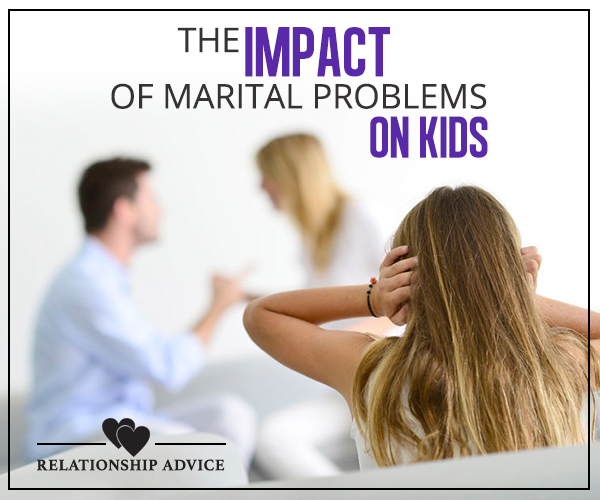
When you’re in the midst of an argument with your partner, do you ever think about how your tone, words or actions are affecting the kids in the household? Are you being overheard with raised voices and harsh words? What is the impact of marital problems on kids? Let’s take a look at how your actions may directly and indirectly affect the young people in your lives that you love.
Kids are around more as they are off school for the summer break now. If you are having strife in your relationship they are going to be more readily exposed to it around the home. They feel the strife and the negative energy in the house if there’s tension between parents. This can manifest as behavioral issues in children both at home and in school/child care situations. Angry outbursts or extremes of emotions, rebellion and resistance and extreme cases of anxiety and worry are common. The maladjustment of children due to marital problems is well documented. There may also be physical manifestations of stress presented as headaches, stomach aches; feelings of depression and/or general malaise. There’s no doubt that children of all ages are negatively affected by conflict between the adults in the household. If you have an animal in the home such as a dog have you ever noticed what happens? you ever noticed what happens.When loud noises (such as yelling) happen, more often than not the animal leaves the room. They are scared. If that occurs with your four legged friend what about the two legged ones.
Children, especially young children, don’t always understand why parents are arguing or fighting and may feel that they are somehow responsible. It’s not uncommon for children to take the blame upon themselves, thinking that if they hadn’t been naughty or done something bad, their parents would be happy. They may also feel anxious and fearful, feel unsafe or under threat of violence if their parents are having intense anger or arguments in the home. Older children quite often rebel and get aggressive there may be an increase in aggressiveness between children. Some kids withdraw inside themselves and become increasingly depressed and morose.
What can parents do to help kids feel better?
- Use techniques proven to calm an anxious child. See http://lemonlimeadventures.com/what-to-say-to-calm-an-anxious-child/
- Realize and take responsibility for your part in creating an atmosphere where your child feels stressed or fearful.
- Amend your behavior to be more polite, patient and understanding. Don’t insult your partner or raise your voices especially in front of the children. Don’t disrespect the other parent or say negative things about their parent to the child. Don’t make kids choose sides.
- Talk to your kids about what’s happening to help them understand they’re not to blame. Use age appropriate language and only give details as needed. Older children can understand more of the intricacies of relationships.
- Have family discussions and give your kids a safe place to express their feelings and worries. Talk through them. Reassure them that they are loved and important and that none of these problems are their fault or responsibility to fix.
- Explain that adults sometimes argue, and that you and your partner are going through a bit of a tough time right now, you’re working to sort it out, and you’ll try to do better.
- It’s ok to apologize and explain that children are deeply loved and valued by both parents, and that sometimes we get triggered and angry. It’s not a bad thing as long as you act properly when you are angry. Children need to know that happens. It’s how you resolve the issues, how you keep your promises and follow through and keep your word that matters.
- Avoid spreading negativity and negative talk
- Keep working on solutions.
- Give more hugs and love to your kids. Give them structure and as much routine as you can in the middle of your busy lives. Help them to feel loved and secure no matter what is going on between you and your partner.
We’re often so deep into our own issues and feelings that we forget to stop and consider what kind of impact our actions are having on all the lives we are connected to. A problem in the relationship doesn’t need to escalate to the point where children are feeling unsafe or fearful. If you and your partner feel like you’re getting in too deep into a negative pattern of interacting with each other, seek out a qualified couples and/or family counselor to help you sort through your differences and restore harmony and peace in the household.
Subscribe to My YouTube Channel
Ask Me a Question
If you have a question, comment, thought, or concern, feel free to comment below. We’d love to hear from you!

